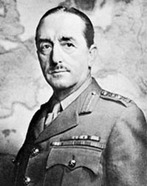Alan Brooke (23 Jul. 1883 - 17 Jun. 1963)

At the beginning of the war, Brooke was in command of II Corps in the British Expeditionary Force. He became renowned for his pessimistic view of countering any German offensive, being critical of the French Army. Brooke commanded his forces well during the German attack, and his handling of the British withdrawal to Dunkirk drew acclaim. On 29 May, Brooke was ordered to return to England. From there he was sent back to France, where he saw the British position there as weak and informed Churchill that troops should be withdrawn from France. Churchill later agreed.
When he returned he was put in charge of preparing anti-invasion plans in Britain. Brooke stated after the war that he would use “sprayed mustard gas on the beaches”. However, the invasion plans never went that far. In December 1941, Brooke became Chief of the Imperial General Staff – the professional head of the army. In this role he was military advisor to Churchill and his War Cabinet, and also gave advice to the Allied forces elsewhere.
Whilst in the Combined Chiefs of Staff, Brooke advocated a European invasion through Italy, to eliminate the Italians from the war and put pressure on German troops, which contrasted with the views of the Americans to invade Western Europe. This was later agreed at the Casablanca conference of 1943. His early pessimism in France returned when he doubted the success of Operation Overlord, the D-Day Landings. He was not one for compromise, and his relationship with Churchill became increasingly difficult throughout the war, Brooke feeling that he had been overlooked for major military posts. However, there was much respect between the two men.
A wary character, Brooke’s opposition to an invasion of Western Europe delayed D-Day and earned some contempt from Allied commanders. However, his intelligence and military wisdom earned him great respect, and the war in Europe until 1943, when there was little American involvement, went largely to his plans.
For more information on Alan Brooke:
Alanbrooke, Field Marshal Lord. War Diaries 1939 – 1945 (London: Weidenfeld & Nicolson), 2001.
Mead, Richard. Churchill’s Lions: A Biographical Guide to the Key British Generals of World War II (Stroud: Spellmount), 2007.
When he returned he was put in charge of preparing anti-invasion plans in Britain. Brooke stated after the war that he would use “sprayed mustard gas on the beaches”. However, the invasion plans never went that far. In December 1941, Brooke became Chief of the Imperial General Staff – the professional head of the army. In this role he was military advisor to Churchill and his War Cabinet, and also gave advice to the Allied forces elsewhere.
Whilst in the Combined Chiefs of Staff, Brooke advocated a European invasion through Italy, to eliminate the Italians from the war and put pressure on German troops, which contrasted with the views of the Americans to invade Western Europe. This was later agreed at the Casablanca conference of 1943. His early pessimism in France returned when he doubted the success of Operation Overlord, the D-Day Landings. He was not one for compromise, and his relationship with Churchill became increasingly difficult throughout the war, Brooke feeling that he had been overlooked for major military posts. However, there was much respect between the two men.
A wary character, Brooke’s opposition to an invasion of Western Europe delayed D-Day and earned some contempt from Allied commanders. However, his intelligence and military wisdom earned him great respect, and the war in Europe until 1943, when there was little American involvement, went largely to his plans.
For more information on Alan Brooke:
Alanbrooke, Field Marshal Lord. War Diaries 1939 – 1945 (London: Weidenfeld & Nicolson), 2001.
Mead, Richard. Churchill’s Lions: A Biographical Guide to the Key British Generals of World War II (Stroud: Spellmount), 2007.

